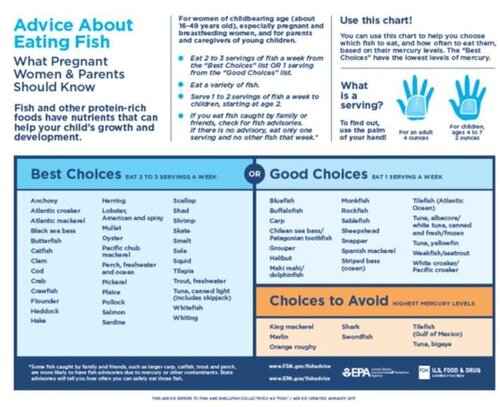- Find a Provider
-
Services
-
Redeemer Health provides compassionate care across every stage of life.
- View all Services
- Health Care
- Cancer Care
- Heart Care
- Hospital at Home
- Maternity Care
- Infusion Therapy Center
- More Health Care Services
-
- Patients & Visitors
- Locations
- Careers
Good Fish. Bad Fish.
October 11, 2019
categories:

You may have read studies advising women who are trying to conceive, pregnant or breastfeeding to steer clear of seafood due to concerns over mercury consumption. Why?
High levels of methylmercury can affect a baby’s developing brain. Mercury occurs naturally in the environment and is also released into the air as a by-product of some industrial processes. When mercury gets into the soil and water (including lakes, rivers, and the ocean), bacteria and fungi change mercury into methylmercury and, since methylmercury is in our water causes it to be present in pretty much all fish and shellfish.
Because methylmercury is absorbed into fish tissues, it can’t be removed by cleaning or cooking, so if you eat a lot of fish with high levels, it might build up in your gastrointestinal (GI) tract, where it takes a long time to get rid of it.
If you weren’t a fish fan to begin with, this might seem like a perfect reason to avoid it altogether.
But in July of 2019, the Food and Drug Administration and Environmental Protection Agency released an updated report revealing that the benefits of eating seafood far outweigh the risks. The agency recommends that pregnant women consume 8 to 12 ounces of seafood (or 2 to 3 servings, per week), choosing foods that are the lowest in mercury, such as cod, flounder, salmon, shrimp, while avoiding those with the highest mercury levels, such as king mackerel, swordfish, bigeye tuna, and shark.

Confirming this advice, a recently released study out of Spain followed nearly 2,000 moms and their babies from the first trimester of pregnancy through the child's fifth birthday. Their findings reported that omega-3 acids found in fish are linked to a reduced risk of depression (which affects 10-15% of all pregnant women), a healthier birth weight, improved development and cognitive brain function, and possibly asthma prevention.
Next time you go shopping, don’t skip the fish! Be mindful of what and how much you’re consuming.



